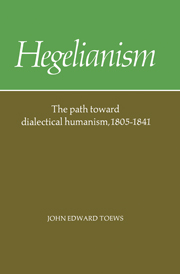Book contents
- Frontmatter
- Contents
- Preface
- Introduction: the Hegelian project in ideological perspective
- PART I PHILOSOPHY AND CULTURAL INTEGRATION: HEGEL IN CONTEXT
- 1 The origins of the Hegelian project: tensions in the father's world
- 2 Revolution and Romanticism: the generational context of Hegel's ideology of cultural integration
- 3 The reconciliation of Reason and reality: Hegel's differentiation from Romanticism
- PART II THE HISTORICAL APPROPRIATION OF THE ABSOLUTE: UNITY AND DIVERSITY IN THE HEGELIAN SCHOOL, 1805–1831
- PART III THE REDUCTION OF THE ABSOLUTE TO “MAN”: THE DIVISION OF THE SCHOOL AND THE EMERGENCE OF THE HEGELIAN LEFT, 1830–1841
- EPILOGUE: BEYOND “MAN” – THE RISE AND FALL OF LEFT HEGELIAN HUMANISM
- Notes
- Bibliography
- Index
1 - The origins of the Hegelian project: tensions in the father's world
Published online by Cambridge University Press: 08 January 2010
- Frontmatter
- Contents
- Preface
- Introduction: the Hegelian project in ideological perspective
- PART I PHILOSOPHY AND CULTURAL INTEGRATION: HEGEL IN CONTEXT
- 1 The origins of the Hegelian project: tensions in the father's world
- 2 Revolution and Romanticism: the generational context of Hegel's ideology of cultural integration
- 3 The reconciliation of Reason and reality: Hegel's differentiation from Romanticism
- PART II THE HISTORICAL APPROPRIATION OF THE ABSOLUTE: UNITY AND DIVERSITY IN THE HEGELIAN SCHOOL, 1805–1831
- PART III THE REDUCTION OF THE ABSOLUTE TO “MAN”: THE DIVISION OF THE SCHOOL AND THE EMERGENCE OF THE HEGELIAN LEFT, 1830–1841
- EPILOGUE: BEYOND “MAN” – THE RISE AND FALL OF LEFT HEGELIAN HUMANISM
- Notes
- Bibliography
- Index
Summary
In the fall of 1788, Hegel, who had just passed his eighteenth birthday, left his parental home in Stuttgart in order to begin a five-year program of theological study at the Protestant Seminary (Stift) in Tübingen. By going to Tübingen he was acting in conformity with the long-standing wishes of his father, and following the traditional avenue toward becoming a man of importance in his father's world. During the years at home and school in which the young Hegel was being prepared for his future vocation as a spiritual leader in the traditional culture of Old Württemberg (Altwürttemberg), however, this world was characterized by increasing political, social, and cultural tensions. Contrary to his father's hopes and expectations, Hegel's experience at Tübingen led not to a personal identification with the vocation that had been chosen for him, but to a radical disinheritance and commitment to liberation from the whole cultural world that had provided that vocation with meaning and importance. Hegel would later describe this crisis in terms of a universal revolution in man's cultural development, but the manner in which he perceived the general transformation was conditioned by the conceptual and experiential framework he brought to it from his own particular past in the ancien régime. When his father died in 1799, Hegel used his inheritance to finance the beginning of the academic career and philosophical vocation that defined his cultural identity for a new age.
- Type
- Chapter
- Information
- HegelianismThe Path Toward Dialectical Humanism, 1805–1841, pp. 13 - 29Publisher: Cambridge University PressPrint publication year: 1981

